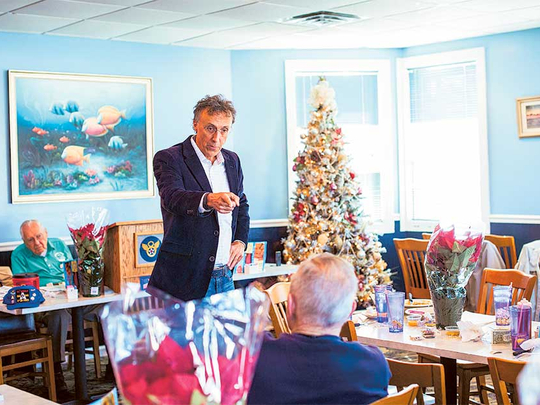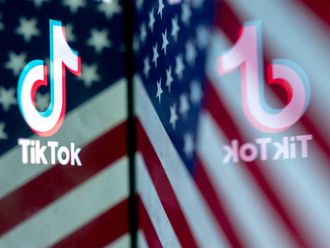
HENDERSONVILLE, North Carolina: Jeff Miller, a dry cleaner owner who serves on the City Council in Hendersonville, North Carolina, was driving his green truck late Monday afternoon when news of the Christmas market attack in Berlin came on the radio.
“I thought, here we go again,” he said. “So sad.”
But there was also something new.
“This world’s dangerous right now, and I don’t think we are nearly where we need to be with border security,” he said. “I believe Donald Trump wants to do it right.”
As Trump prepares to assume the presidency next month, one of the biggest issues he will face is immigration. His incendiary rhetoric prompted some of the most enduring images of the campaign, with chants like “build the wall” and calls for deportations and bans on Muslims.
In Henderson County, an upper middle-class patch of western North Carolina where solid suburban homes stand next to hilly apple orchards, Trump’s tone did not appeal, but the underlying message hit home. Immigration looms large: Hispanics make up about 10 per cent of the population.
But they are a familiar part of the landscape. They are Christians. They have been a big part of the community for decades. Muslims, however, are none of those things. Few people in Hendersonville seem to know any. Most of what people know comes in the form of the daily drip of news into their iPads, and that does not leave a good impression. So the part of the immigration message that really resonates is about Muslims from the Middle East.
“It’s a little different than any time in history, when we are seeing this level of terrorism sweeping the world, and that has gotten people’s attention,” said Bill Campbell, pastor at Hendersonville Presbyterian Church. “Terrorism is an ideology, it’s not a religion, but the religion that tends to give birth to it most often these days is Islam. The threat from that is very real, and we can’t just ignore it.”
And while Trump has bounced around on the topic since Election Day — on Wednesday his spokesman indicated that suspending immigration from countries with a lot of terror attacks was still part of his plan — many moderate voters say they are hopeful about where he will eventually land.
“I’m telling you, he’s going to surprise people, he’s going to make people mad on both sides,” said Greg Mathis, senior pastor at the Mud Creek Baptist Church in Hendersonville. “Sometimes he’s too blunt, maybe a little too raw. But securing our borders has been a long time coming, and Donald Trump was the first one in a long time to say it. I think that’s what registered with so many people in this country.”
US Muslim organisations say that singling out Muslims amounts to racial profiling, and that Trump has deliberately stirred the pot, promoting theories about Muslims that simply are not true. They say that violence comes from ideological zealots, not from Islam. They say that the United States already does extremely vigorous vetting of immigrants and that some recent attacks that cited the Daesh were carried out by Muslims who were born in the United States.
“We’ve never said that people don’t have real fears about international or domestic incidents and national security,” said Ibrahim Hooper, a spokesman for the Council on American-Islamic Relations in Washington. “But you want to take actions that are actually based on reality, not on wild conspiracy theories of Muslims about to overthrow the Constitution, or institute Sharia.”
Miller had some reservation in voting for Trump and said he was as surprised as anyone that he won. He didn’t like Trump’s attacks on Senator John McCain or his calls for mass deportations. Hispanics have long been part of life in Hendersonville, picking apples in the orchards, and Miller sees them as hard workers with strong family values. He employs several in his dry cleaning store. He strongly supports President Barack Obama’s 2014 order shielding young undocumented immigrants. It helped a young family friend.
“People are very welcoming here,” said Brother Roberto Perez, of the Immaculate Conception Catholic Church. “At the local level, they go out of their way to help.”
Hispanics are also churchgoers. They make up about half the congregation at Immaculate Conception. Mathis at Mud Creek has added a Spanish-language service on Sundays and had his book about Jesus translated into Spanish.
“The thing about these immigrants — they settle down, they work hard, they are very family oriented and they are Christians,” said Seth Smith, 37, a computer repairman in Hendersonville. “I don’t mind sharing my home as long as it is on fair terms with people who are working hard and keeping the same cultural values that makes this community this community.”
Muslims are so scarce that few people in Hendersonville seem to know any. And the news kept happening: Paris, San Bernardino, Nice, Orlando.
There was a disconnect, Campbell said. People wanted an open discussion about political Islam and the problems it poses for open societies, but felt as if they weren’t getting it.
“I can understand this administration not wanting to use words like ‘Islamic terrorism’ and wanting to soften things, but I also understand the angst when we are not having an open discussion,” he said. “That leaves it open for fearmongering.”
This summer, when word got out that some members of a local church were talking about resettling Syrian refugees, many people objected. Miller was among them.
The reticence was not about lack of compassion. Local people, including his business, generously fund a well-equipped Boys and Girls Club. The Bounty of Bethlehem programme draws hundreds of volunteers and donations for Christmas gifts and dinners for the needy every year.
But worries about migrants from the Middle East run deep.
“Let’s take care of our own before we expand to a group there’s so much uncertainty about,” said Miller, 62, a co-founder of a non-profit for veterans. For example, there are many homeless veterans in the county who need care, he said.
“Some people believe they can wrap their arms around anyone and make them their friend,” he said. “But they could stab you in the back.”
Khalid Bashir, president of the Islamic Center of Asheville, in the nearby county of Buncombe, said Muslim Americans were no different from any other Americans in wanting to keep terrorists out of the United States. He estimated that there were 75 to 100 Muslim families in western North Carolina and that probably 20 of them lived in Henderson County. He knows one in which the mother is a nurse, the father a car dealer, and their daughter is in college.
“Generally speaking, the stand for the Muslims is that nobody wants to have borders which are porous, including Muslim people,” Bashir said. “But making blanket statements about whole groups of people, whole religious groups, that’s what people are against.”
Hooper said that many Americans had a distorted view of even the most basic facts about Muslims, one that often exaggerates their influence. He cited a recent study that found that, on average, Americans guess that Muslims are 17 per cent of the population, when the real number is between 1 or 2 per cent. And unlike in some places in Europe, in the United States Muslims are remarkably well integrated into society.
He said anti-Muslim incidents had spiked since the election. He got a call recently from a man who was disparaging Islam. When he asked if the man was threatening him, he replied: “I don’t have to. My president will take care of you for me.”
Many people interviewed in Henderson County said that it was wrong to target all Muslims and that making policy would be hard — more brain surgery than ditch digging.
“We do have to be careful about this,” Campbell said. “This is complex. We don’t want to alienate people who come from the Middle East.”
Jibril Hough, a Muslim activist in Charlotte, North Carolina, said some of the post-9/11 policies would probably be reinstated, but he was sceptical that Trump’s more radical propositions would actually happen.
“I think it’s going to be tougher, but I don’t think it’s going to be as extreme as it’s being played right now,” he said.
For Miller, the key will be whom Trump chooses for his team — and if he listens. Some of the appointments are concerning. He wishes he would stop posting to Twitter. Still, he wants people to give Trump a chance.
“I wish we could all set it aside right now and let the man see what he can do,” he said.












